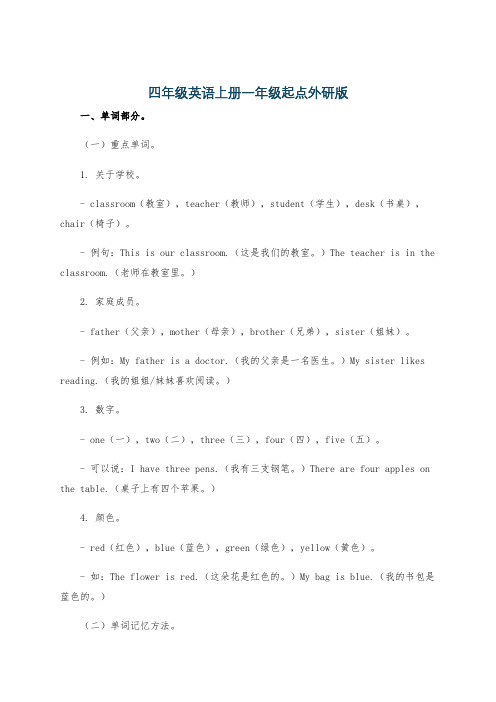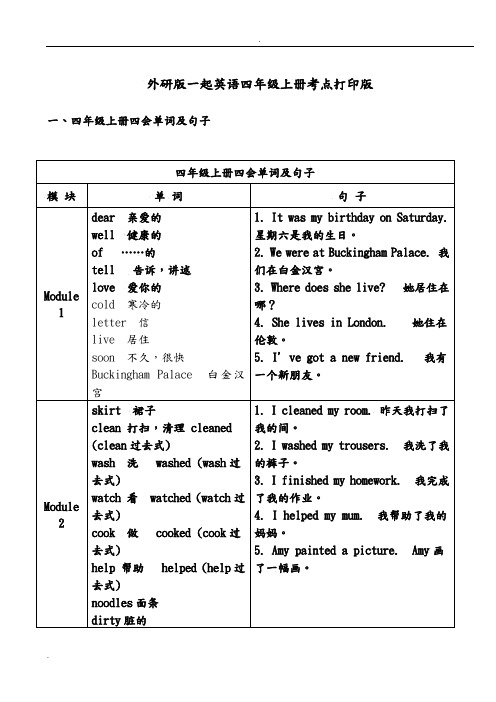外研版(一年级起点)四年级英语上册知识点复习
(精品)(一年级起点)四年级英语上册知识点(外研版)72

(一年级起点)四年级英语上册知识点(外研版)本资料为woRD文档,请点击下载地址下载全文下载地址 英语四年级上册知识点 一、 动词过去式 go——went see(看见)——saw take(需要花费)——took eat——ate have(度过)——had buy(买)¬——bought wear——wore fall(掉下、摔倒)——fell is(是)——was are(是)——were get(得到、抓住)——got do(做)——did say(说)——said come(来)——came sing(唱歌)——sang make(制作)——made ride(骑)——rode drink——drank speak(讲话)——spoke fly(飞)——flew lose(丢失)——lost find(发现)——found win(赢,获胜)——won become(变成)——became run(跑)——ran break(打破)——broke cut(切、割)——cut hurt(使疼痛、使受伤)——hurt learn——learnt wash(清洗)——washed finish(完成)——finished clean——cleaned help(帮助)——helped cook(煮)——cooked phone(打电话)——phoned watch——watched paint——painted play——played live——lived invent(发明)——invented stay(停留)——stayed practise(练习)——practised carry(拿、搬)——carried bump(碰、撞)——bumped happen(发生)——happened climb——climbed 二、 名词的复数形式(一般名词复数形式都是在名词后加s) candy——candies leaf(树叶)——leaves is(是)——are this——these that(那)——those child(儿童)——children 三、 习惯搭配或短语 、read a letter——读一封信 2、live in——住在 3、a photo of——一张……的照片 4、at Buckingham Palace——在白金汉宫 5、on Sunday——在星期天 6、write to me——写信给我 7、very well——非常好 8、thank you for——感谢你的…… 8、wash my shirt/skit/trousers——洗我的衬衫/短裙/裤子 9、clean my(your)room——打扫我的(你的)房间 0、help my mum——帮助我的妈妈 1、cook noodles——煮面条 2、watch TV——看电视 3、play the flute——吹长笛 4、listen to music——听音乐 5、paint a picture——画一幅画 6、finish my homework——完成我的家庭作业 7、play with me——和我一起玩 6、play football——踢足球 8、get up——起床 9、go to bed——上床睡觉 20、at school(home)——在学校(家) 21、National Day——国庆节 22、ride my(your)bike——骑我的(你的)车 23、walk to school——步行去上学 24、in the park——在公园里 25、stay home——待在家里 26、have English——上英语课 27、invent paper——发明纸 28、invent printing——发明印刷术 29、look at——看 30、look for——寻找 31、last monday——上个星期一 32、this week——这个星期 32、print books and newspapers——印刷书和报纸 33、go on trip——去旅行 34、climb to the top——爬到顶部 35、have a good time——过得愉快 36、a lot——在很大程度上,经常 37、lots of——许多 38、a lot of——许多的 39、at first——起初 40、wear warm cloths——穿暖和的衣服 skating——去滑冰 42、go to the zoo——去动物园 43、come to china——来中国 44、come back——回来 45、a magic paintbrush——一支有魔力的笔 46、long ago——很久以前 47、a good boy(girl)——个好男孩(女孩) 48、on your head——在你的头上 front of——在……前面 50、stand up——起立 51、my favourite doll——我最喜欢的玩偶 52、fall over——摔倒 53、fall of——从……跌落 54、be able to——能够 55、go out——出去 56、win the gold cup——赢得金奖杯 57、look tired——看上去很累 58、take a picture of you——拍一张你的照片 59、under the tree——在树下 60、ride bike——骑单车 61、bump my head——撞到我的头 62、cut my finger——划破我的手指 63、computer game——计算机游戏 64、every morning——每天早晨 65、play with her(his)toys——玩她(他)的玩具 66、buy you a present——给你买一份礼物 67、do some exercise——做一些运动 68、eat some fruit——吃一些水果 69、wash your hands——洗手 70、go to the toile——去厕所 71、take … away——把……拿走 72、have(has) got——拥有。
四年级英语上册知识点汇总(外研版一起)

四年级英语上册知识点汇总(外研版一起) 外研一起四年级上册期末复知识点一、动词过去式以下是一些常见动词的过去式形式:go(去)——wenteat(吃)——atesee(看见)——sawhave(度过)——hadXXX(需要花费)——tookbuy(买)——boughtis(是)——wasdo(做)——didwear(穿)——worefall(掉下、摔倒)——fellare(是)——weresay(说)——saidmake(制作)——madespeak(讲话)——spokefind(发现)——foundrun(跑)——ranget(得到、抓住)——got come(来)——cameride(骑)——rodefly(飞)——flewsing(唱歌)——sangdrink(喝)——XXXlose(丢失)——lostXXX(变成)——XXXcut(切、割)——cutlearn(研究)——learntclean(打扫)——cleanedXXX(赢、获胜)——won break(打破)——brokehurt(使疼痛、使受伤)——hurtwash(清洗)——washedfinish(完成)——finishedhelp(帮助)——XXXcook(煮)——cookedphone(打电话)——phonedplay(玩、游戏)——XXXstay(停留)——XXXwatch(看)——watchedpaint(绘画)——paintedlive(居住)——livedinvent(发明)——inventedpractise(练)——practisedbump(碰、撞)——XXXclimb(爬)——climbedcarry(拿、搬)——carriedXXX(发生)——happened二、名词的复数形式一般名词复数形式都是在名词后加s, 以下是一些例子:candy(糖果)——XXXthis(这)——theseleaf(树叶)——XXXis(是)——arethat(那)——thosechild(儿童)——children三、惯搭配或短语以下是一些常见的惯搭配或短语:read XXX(读一封信)live in(住在)a photo of(一张……的照片)at Buckingham Palace(在白金汉宫)on Sunday(在星期天)1.XXX.2.Please XXX.3.XXX project.4.XXX(your) shirt/skirt/trousers for me?5.I need to cleanmy(your) room before my guests arrive.6.Can you helpmymum carry these groceries inside?7.XXX.8.I like to watchTV before bed.9.XXX she works.10.XXX.11.I want to paintapicture of the sunset.12.XXX I XXX.13.I always XXX.14.We like to playfootball on the weekends.15.It's getting late。
四年级英语上册一年级起点外研版

四年级英语上册一年级起点外研版一、单词部分。
(一)重点单词。
1. 关于学校。
- classroom(教室),teacher(教师),student(学生),desk(书桌),chair(椅子)。
- 例句:This is our classroom.(这是我们的教室。
)The teacher is in the classroom.(老师在教室里。
)2. 家庭成员。
- father(父亲),mother(母亲),brother(兄弟),sister(姐妹)。
- 例如:My father is a doctor.(我的父亲是一名医生。
)My sister likes reading.(我的姐姐/妹妹喜欢阅读。
)3. 数字。
- one(一),two(二),three(三),four(四),five(五)。
- 可以说:I have three pens.(我有三支钢笔。
)There are four apples on the table.(桌子上有四个苹果。
)4. 颜色。
- red(红色),blue(蓝色),green(绿色),yellow(黄色)。
- 如:The flower is red.(这朵花是红色的。
)My bag is blue.(我的书包是蓝色的。
)(二)单词记忆方法。
1. 联想法。
- 对于“desk”(书桌)这个单词,可以联想成“desk”上有很多“d”形状的东西,像是书本之类的。
- 例如“father”(父亲),可以联想父亲很“fat”(胖),虽然不完全准确,但有助于记忆。
2. 制作单词卡片。
- 把单词写在卡片的一面,解释或者例句写在另一面。
例如“teacher”这个单词,正面写“teacher”,背面写“A person who teaches students in school.”(在学校教学生的人)二、句型部分。
(一)日常问候句型。
1. 见面问候。
- How are you?(你好吗?)- 回答可以是:I'm fine, thank you.(我很好,谢谢你。
外研版(一年级起点)英语四年级上册考点打印版.doc

外研版一起英语四年级上册考点打印版一、四年级上册四会单词及句子二、动词过去式go(去)——went see(看见)——saw take(需要花费)——tookeat(吃)——ate have(度过)——had buy(买)——boughtwear(穿)——wore fall(掉下、摔倒)——fell is(是)——wasare(是)——were get(得到、抓住)——got do(做)——didsay(说)——said come(来)——came sing(唱歌)——sangmake(制作)——made ride(骑)——rode drink(喝)——drankspeak(讲话)——spoke fly(飞)——flew lose(丢失)——lostfind(发现)——found win(赢,获胜)——won become(变成)——became run(跑)——ran break(打破)——broke cut(切、割)——cuthurt(使疼痛、使受伤)——hurt learn(学习)——learntwash(清洗)——washed finish(完成)——finished clean(打扫)——cleaned help(帮助)——helped cook(煮)——cooked phone(打电话)——phoned watch(看)——watched paint(绘画)——painted play(玩、游戏)——played live(居住)——lived invent(发明)——invented stay(停留)——stayedpractise(练习)——practised carry(拿、搬)——carriedbump(碰、撞)——bumped happen(发生)——happenedclimb(爬)——climbed三、名词的复数形式(一般名词复数形式都是在名词后加s)Candy(糖果)——candies leaf(树叶)——leaves is(是)——are this(这)——these that(那)——those child(儿童)——children四、习惯搭配或短语1、read a letter——读一封信2、live in——住在3、a photo of——一张……的照片4、at Buckingham Palace——在白金汉宫5、on Sunday——在星期天6、write to me——写信给我7、very well——非常好 8、thank you for——感谢你的……8、wash my(your) shirt/skit/trousers——洗我的(你的)衬衫/短裙/裤子9、clean my(your) room ——打扫我的(你的)房间10、help my mum——帮助我的妈妈 11、cook noodles——煮面条12、watch TV——看电视 13、play the flute——吹长笛14、listen to music——听音乐 15、paint a picture——画一幅画16、finish my homework——完成我的家庭作业17、play with me——和我一起玩 16、play football——踢足球18、get up——起床 19、go to bed——上床睡觉20、at school(home)——在学校(家) 21、National Day——国庆节22、ride my(your) bike——骑我的(你的)车23、walk to school——步行去上学 24、in the park ——在公园里25、stay at home——待在家里 26、have English——上英语课27、invent paper——发明纸 28、invent printing——发明印刷术29、look at——看 30、look for——寻找31、last Monday——上个星期一 32、this week——这个星期32、print books and newspapers——印刷书和报纸33、go on a trip——去旅行 34、climb to the top——爬到顶部35、have a good time——过得愉快 36、a lot——在很大程度上,经常37、lots of——许多 38、a lot of——许多的39、at first——起初 40、wear warm cloths——穿暖和的衣服41、go skating——去滑冰 42、go to the zoo——去动物园43、come to china——来中国 44、come back——回来45、a magic paintbrush——一支有魔力的笔46、long ago——很久以前 47、a good boy(girl)——个好男孩(女孩)48、on your head——在你的头上 49、in front of——在……前面50、stand up——起立 51、my favourite doll——我最喜欢的玩偶52、fall over——摔倒 53、fall of——从……跌落54、be able to——能够 55、go out——出去56、win the gold cup——赢得金奖杯 57、look tired——看上去很累58、take a picture of you——拍一张你的照片59、 under the tree——在树下 60、ride bike——骑单车61、bump my head——撞到我的头 62、cut my finger——划破我的手指63、computer game——计算机游戏 64、every morning——每天早晨65、play with her(his) toys——玩她(他)的玩具66、buy you a present——给你买一份礼物67、do some exercise——做一些运动 68、eat some fruit——吃一些水果69、wash your hands——洗手 70、go to the toile——去厕所71、take … away——把……拿走 72、have(has) got——拥有。
小学英语外研版(一起点)四年级上册课本《知识点》汇总

四年级英语上册课本知识点汇总Module1【词汇】dear(亲爱的)well(健康的)of(......的)soon(不久,很快)tell(告诉,讲述)love(爱你的)【惯用表达】【重点句型】1.表达“我有......”的句型:I’vegot+其他.eg:I’vegotanewbook.2.描述过去某天是我的生日的句型:Itwasmybirthday>具体某一天.eg:ItwasmybirthdayonFriday.Module2【词汇】skirt(短裙)clean(打扫,清理)finish(完成)dirty(脏的)paint(绘画)Mr(先生)phone(打电话)【重点句型】表达“过去某人做某事”:主语+动词过去式+其他.eg:Icleanedmyroom.Jennywashedherskirt.Wewenttothepark.Module3【词汇】名词:stay(停留)what(多么)boring(无聊的;令人厌烦的)day(一天;白天)其他:visit(拜访)comic(滑稽的)together(一起)didn’t=didnot(不)【习惯搭配】【惯用表达】【重点句型】1.描述“某人过去没有做某事”的句型:主语+didn’t+事情+时间.eg:1.Shedidn’tplayfootballyesterday.2.Theydidn'twatchTVlastweek.Module4【词汇】1.invent发明,创造2.paper纸3.important重要的4.printing印刷术5.print印刷6.right正确的,对的7.between在……之间8.bicycle自行车9.mouse老鼠10.man男人【习惯搭配】1.Chinesepeople中国人2.thisweek这个星期3.inventpaper发明纸4.inventprinting发明印刷术5.lookat看6.printbooksandnewspapers印刷书和报纸7.infrontof在……前面stMonday上星期一9.inventmanyimportantthings发明很多重要的东西【惯用表达】1.That’sright.没错。
外研版英语一年级起点四年级上册

外研版英语一年级起点四年级上册一、单词部分。
1. 重点单词汇总。
- School subjects(学科)- maths(数学):“maths”的发音为[mæθs],注意“th”的发音。
例如:I like maths. It's interesting.(我喜欢数学,它很有趣。
)- Chinese(语文):这个单词既可以表示“中国人”,也可以表示“语文”这一学科。
如:We have Chinese class every day.(我们每天都有语文课。
)- English(英语):是国际通用语言,在学校也是重要学科。
例如:My English teacher is very kind.(我的英语老师很和蔼。
)- science(科学):[ˈsaɪəns],科学课上我们会做实验。
如:We do experiments in science class.- art(美术):美术课可以画画、做手工等。
例如:I draw a picture in art class.- PE(体育):[ˌpi: ˈi:],体育课上我们会做运动。
如:We play football in PE class.- Classroom objects(教室物品)- desk(书桌):复数形式是“desks”。
这是我们在教室里用来学习的桌子。
例如:There are many desks in the classroom.- chair(椅子):复数是“chairs”。
如:The chair is very comfortable.(这把椅子很舒服。
)- blackboard(黑板):老师在黑板上写字。
例如:The teacher writes on the blackboard.- book(书):复数是“books”。
如:I have many books in my schoolbag.- People(人物)- teacher(教师):有不同学科的老师。
外研版(一年级起点)英语四年级上册考点打印版.doc

外研版一起英语四年级上册考点打印版一、四年级上册四会单词及句子四年级上册四会单词及句子模块单词句子Module1dear 亲爱的well 健康的of ……的tell 告诉,讲述love 爱你的cold 寒冷的letter 信live 居住soon 不久,很快Buckingham Palace 白金汉宫1. It was my birthday on Saturday. 星期六是我的生日。
2. We were at Buckingham Palace. 我们在白金汉宫。
3. Where does she live? 她居住在哪?4. She lives in London. 她住在伦敦。
5. I’ve got a new friend. 我有一个新朋友。
Module2skirt 裙子clean 打扫,清理cleaned(clean过去式)wash 洗washed (wash过去式)watch 看watched (watch过去式)cook 做cooked (cook过去式)help 帮助helped (help过去式)noodles面条dirty脏的Mr先生1. I cleaned my room. 昨天我打扫了我的间。
2. I washed my trousers. 我洗了我的裤子。
3. I finished my homework. 我完成了我的作业。
4. I helped my mum. 我帮助了我的妈妈。
5. Amy painted a picture. Amy画了一幅画。
yesterday 昨天paint 绘画finish 完成finished (finish过去式)trousers 裤子phoned 打电话(过去式)Module3get up 起床walk 走didn’t=did not 不(过去式)school 学校day 一天,白天what 多么boring 无聊的,令人厌烦的National Day 国庆节stay 留stayed (stay过去式)ride 骑bike 自行车1. Lingling didn’t get up at 7 yesterday.玲玲昨天不是在7点起床。
外研版小学英语一年级起点四年级上册知识点总结

外研版小学英语一年级起点四年级上册知识点总结Module1
1.重点单词
behind在.后面left左边
right右边lost迷路的
street街道,大街supermarket超市cinema电影院
train火车hill小山
house房屋station车站
2.牢记小尾巴
live at居住,住在next to紧靠.旁边at the station在车站
3.重点短语
excuse me打扰一下turn left向左转turn right向右转go straight on直着走up the hil上山down the hill下山near the house在房子附近
4.重点句型
(1)—-Excuse me.Where's the..,please?
打扰一下,请问..在哪儿?
(2)——Thank you so much.十分感谢你。
——You are welcome.
Module2
1.重点单词
run跑步these这些children孩子们China中国
2.重点短语
read a book读书take pictures拍照watch TV看电视play with a toy train玩玩具火车fly a kite放风筝ride a bike骑自行车listen to music听音乐talk to my friend和朋友交谈
3.重点句型
(1)He's taking pictures.他正在拍照。
(2)-What are you doing?你在干什么?
-I'm reading a book.我正在读书。
